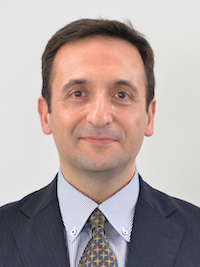 Andrea Pressello
Andrea Pressello
Assistant Professor
National Graduate Institute for Policy Studies (GRIPS)
M.A. (’02) & Ph.D. (’12)
Please tell us about your career path so far.
When I look back at my career so far, the path that I can identify is that before focusing on what I felt was going to be the job that I really wanted to do, I sought to get a wide range of working experiences. When I was an ungraduate student, I realized that I wanted to eventually work in academia. Before doing that, however, I felt that I needed to explore things and options a little bit more. So, as a young man, and after obtaining undergraduate degrees in political sciences and law, I became involved in different types of jobs: from journalism, to a diplomatic institution, to a research position in a company involved in R&D in the automotive sector, to a law firm. After doing this for several years, and after feeling that I had broadened enough my perspective, I finally felt “ready” to start my career in academia, which is what I am currently doing.
You are currently an Assistant Professor at GRIPS. What are your current research interests and what got you interested?
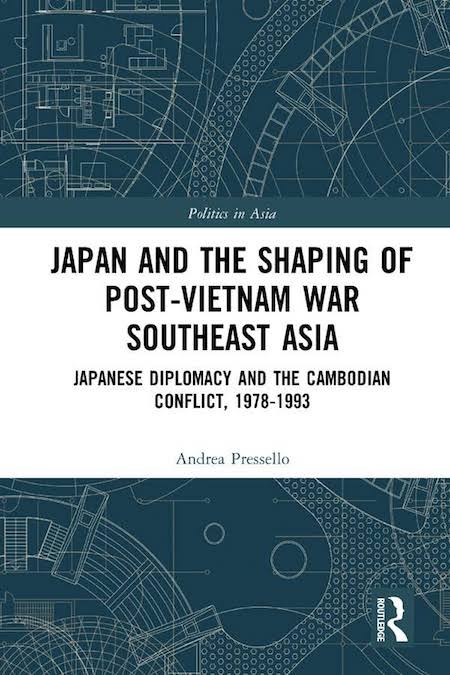
Andrea got his dissertation published by Routledge in 2017.
My research interest is in Japan’s post-World War II diplomatic history. I have been conducting research particularly on Japanese diplomacy toward Southeast Asia from the 1970s to the end of the Cold War. That was a period in which both the regional environment in this part of the world and Japan’s approach to it went through important changes. One of the areas in which this was most visible was Southeast Asia, a region destabilized by conflicts, by the divisions resulting from the Cold War confrontation, and by the uncertainty about a possible power vacuum following the United States’ post-Vietnam War reduced presence in the region. Considering the economic, political and strategic importance of Southeast Asia for Japan, I became interested in investigating how the Japanese addressed these challenges to regional peace and stability.
What excites you about your work and what do you want to achieve with your research?
The combination of my research and teaching activities is what I find particularly exciting in my work. As for my teaching activity, I particularly enjoy discussing about Japan’s history and international relations from the variety of perspectives contributed by the students attending my courses, who generally have quite diverse cultural and educational backgrounds. I find this kind of interaction stimulating and enriching.
As for your question on what I want to achieve with my research, my objective is to make original and useful contributions to my field of research and to share and continuously improve the results of my work.
You were recently one of the recipients of the 14th Nakasone Yasuhiro Award which is given to honor meaningful achievements in the political, economic, cultural, and science and technology fields and encourage further endeavors which will contribute toward the realization of true peace and prosperity in the international community. Congratulations, this must be quite an honor for you!
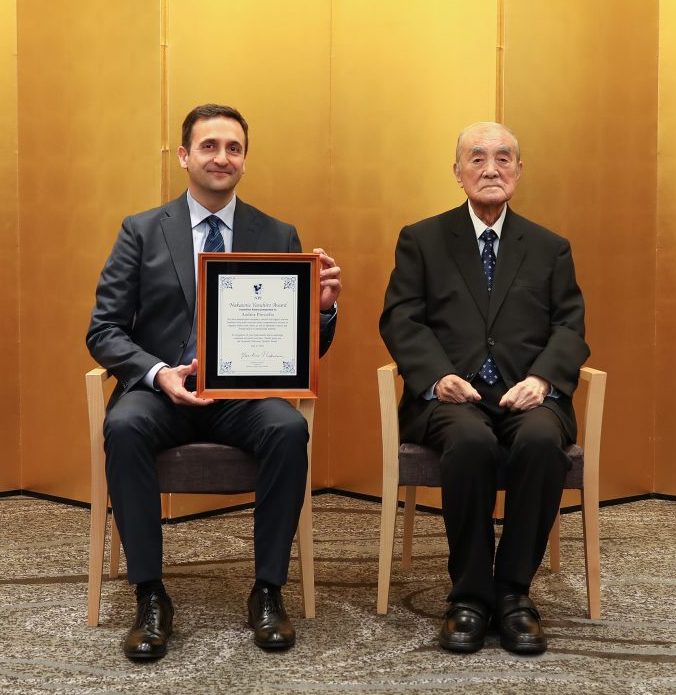
Andrea proudly sitting next to former Prime Minister Yasuhiro Nakasone – who has now reached the respectable age of 100 – at the award ceremony.
Thank you. It was a great honor and privilege for me to receive such a prestigious award. Even more so considering that Prime Minister Nakasone was one of the postwar Japanese prime ministers who I studied with particular interests when I was an undergraduate student. It was therefore exciting for me to receive an award from his institute as well as to meet him at the award ceremony. This award is certainly an incentive for me to keep improving my work and contribution.
For more information of the Nakasone Yasuhiro Award:
http://www.iips.org/en/award/index.html
What do you see yourself doing in ten years’ time? What are your professional goals in the next five, and ten years?
There are several research projects on which I am working or that I have in mind, so in the next five to ten years I see myself working on them and hopefully completing several of them. I have some ideas also related to my teaching activity, so I see myself quite busy in the coming years trying to materialize these projects.
What are some of the biggest challenges you face in your work?
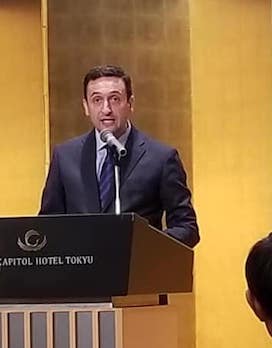
Andrea delivering his speech at the Nakasone Award ceremony
There are several challenges in my work, but if I have to mention one that I have to face daily, then I would say time management. How to allocate enough time to the several work-related activities in which I am involved is something that I constantly try to improve. I am doing better comparing to the past, but there is certainly much room for improvement.
What led you to GRIPS/GSPS? How has your experience at GRIPS prepared you for future endeavours?
I obtained both my master and Ph.D. degrees from GRIPS. I initially chose GRIPS after finding out that the type of courses it offered and the relevant faculty members were suitable for the type of research that I wanted to conduct. The fact that after my master degree I decided to pursue a Ph.D. in the same institution shows that I was happy with my experience at GRIPS. I particularly enjoyed the contents of the program in which I was enrolled (i.e. the Security and International Studies Program) as it offered several subjects related to my research interest. This, together with the guidance that I received from my supervisor and advisors on how to design and conduct academic research and dissertation writing, have played an important role in preparing me for my current career.
You have been living away from your home country for quite some time. What do you miss about Italy?
I am from Rome, a city with a long history and rich of art. Walking in the small backstreets of the city in search of historical sites or interesting places that I did not know is one of the things that I like to do and that I sometimes miss. So, when I go back to my country, I make sure to allocate time for those walks.
Riding my motorbike is another thing that I miss. Here in Tokyo the transportation system is so convenient and fast therefore, at least in my case, there is no need to have my own transportation means. At the moment, I just enjoy riding my bicycle.
Of course, family and friends are among the things that one misses most when living abroad, but considering how popular a destination for tourists Japan has become, every now and then there are some friends or family members who visit me in Tokyo as part of their trips to Japan.
How do you maintain a balance between your work and the rest of your life? And what is your favorite thing to do when you are not working?
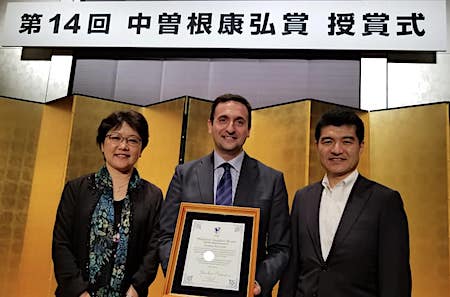
With his GRIPS advisors, Prof. Yoko Iwama and Prof. Narushige Michishita
Maintaining a good work-private life balance is very important and certainly beneficial for our health. Making sure to find such an equilibrium is something on which I have been working, although the results have not always been satisfactory (laugh). When I am not working I do some sport activities, visit new places in Tokyo and surrounding areas, and spend time with friends.
If you could give one piece of advice to anyone considering studying at GRIPS what would it be?
When prospective students ask me about studying at GRIPS, I always strongly recommend them to enroll at this institution. I do so mainly for two reasons, which are based on my own experience of earning both my graduate degrees from GRIPS. First, because of the high quality of the academic experience and the increasing number of activities and programs offered at this institution. Second, because of its international environment. During my studies at GRIPS, I had the opportunity to exchange opinions and establish contacts with so many students from different parts of the world. This was an experience that has enriched me from the point of view of both broadening my perspective and learning so much about other countries, in addition to Japan.




